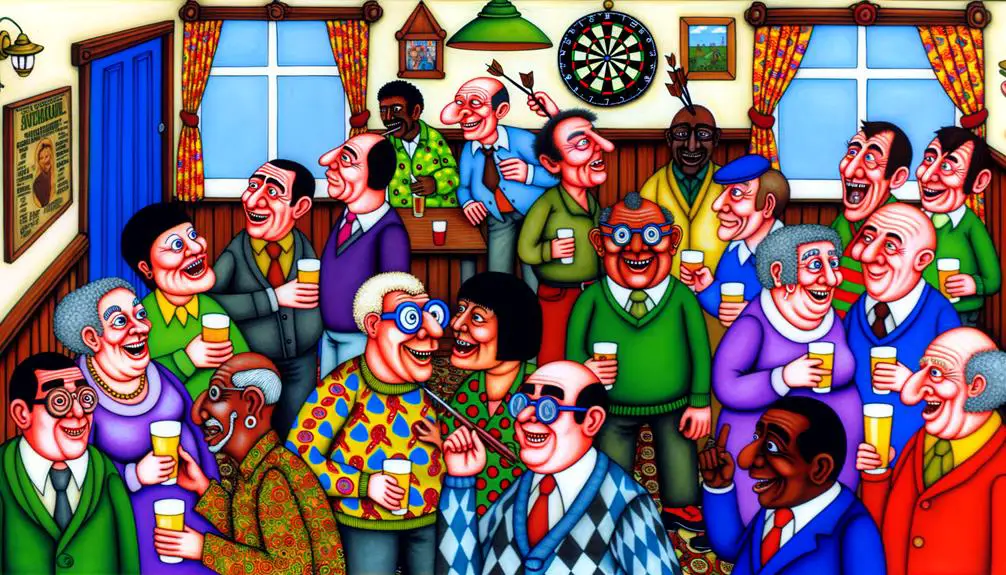In British slang, the term 'sod' has a rich tapestry of meanings and uses, stemming from its Middle English origin, 'sodde.' Over time, it's shifted from describing turf to a multifaceted slang expression. You'll encounter variations such as 'sod off' and 'sod all,' which demonstrate the word's adaptability. Whether used as an insult or a term of empathy, 'sod' showcases the flexibility of the English language in expressing frustration, affection, refusal, or bad luck. Understanding its dual nature in cultural contexts is vital. Grasping the nuances of 'sod' adds depth to your appreciation of English subtleties and slang. Discovering the linguistic journey of 'sod' reveals more about its integral role in daily expressions and interactions.
The Origin of 'Sod'

The term 'sod' originates from the Middle English word 'sodde,' meaning a piece of turf or grassland, and has evolved over centuries into British slang with various meanings. You'll find that sod's etymology reflects a fascinating journey from a simple, literal description of a piece of the earth to a versatile term embedded in the colorful tapestry of British slang. This linguistic evolution isn't just a matter of historical curiosity; it offers insights into how language mirrors social changes and cultural attitudes over time.
Delving into sod's etymology, you encounter its roots in the Old English 'sodd,' which also referred to wet, marshy ground. The shift from a purely descriptive term for a section of the earth to its colloquial usage in British slang underscores the dynamic nature of language. Words aren't static; they breathe, grow, and adapt to the rhythms of human life.
Understanding this evolution requires analyzing historical texts and observing how 'sod' was employed in various contexts. It's a sign of the fluidity of language, illustrating how terms can traverse from the world of the mundane into the domain of expressive slang. This journey from literal to figurative use highlights the creative potential inherent in linguistic evolution.
Understanding Its Variations
Exploring the variations of 'sod' reveals how this term has adopted multiple meanings, reflecting its rich linguistic adaptability and the cultural nuances it encompasses. The sod etymology is deeply rooted in British slang, evolving over time to encompass a range of expressions, from playful banter to outright insults. You'll find that its usage is as diverse as the English language itself, serving as a tribute to the fluid nature of slang.
To understand its versatility, consider how 'sod' functions within various contexts:
| Variation | Meaning |
|---|---|
| Sod off | A rude way to tell someone to go away |
| Poor sod | A sympathetic term for someone in an unfortunate situation |
| Sod's law | The belief that if something can go wrong, it will |
| Sod all | British slang for having or being nothing |
Each of these variations showcases the adaptability of 'sod', moving seamlessly from expressions of frustration to those of empathy. Sod synonyms further expand its linguistic richness, connecting with terms like 'bugger' and 'git', yet 'sod' maintains a unique place in British vernacular. This analysis not only enhances your understanding of 'sod' but also deepens your appreciation for the complexities of slang.
'Sod' in Everyday Language

You'll find that 'sod' is frequently integrated into daily conversations, with its usage and meaning often depending on the context.
The term can vary widely, from a mild insult to a term of endearment among close friends.
Analyzing these variations reveals how flexible and nuanced the English language can be, especially within British slang.
Common 'Sod' Usage
In everyday language, 'sod' pops up frequently, offering insight into its versatile use and cultural significance within British slang. Understanding sod etiquette and mastering sod pronunciation are important to grasping its nuances. This word seamlessly blends into various contexts, reflecting emotions ranging from annoyance to camaraderie. Here's how 'sod' weaves into daily conversations:
- Expressing frustration: 'Sod it!' is a common exclamation of irritation or resignation.
- Referring to someone affectionately or pejoratively: 'You lucky sod!' or 'That lazy sod!'
- Declining offers or suggestions: 'Sod that for a game of soldiers' means to emphatically refuse.
- Indicating bad luck: 'Sod's law' is the British equivalent of 'Murphy's law.'
Analyzing these uses showcases 'sod' as a multifaceted term, rich in emotional and social layers.
Variations of Sod
Diving into the linguistic pool, we find that 'sod' manifests in several variations, each adding a unique shade to its meaning and usage in everyday language.
Tracing back to 'sod etymology,' you'll discover its roots deeply embedded in the soils of Middle English, initially denoting a piece of turf. However, as language evolved, so did 'sod,' morphing into a term of endearment or insult depending on context.
Sod synonyms further illustrate its linguistic flexibility, including 'bugger' and 'git,' which share a similar space in colloquial British English. These variations reflect not just linguistic creativity but also cultural attitudes towards camaraderie and annoyance, making 'sod' a fascinating study of language's adaptive nature.
Navigating Its Dual Nature
You'll find that 'sod' carries a dual nature, often dependent on the cultural context in which it's used. Understanding when it shifts from casual banter to an insult requires a keen sense of its application in various expressions.
This differentiation is vital for anyone looking to grasp the nuances of British slang accurately.
Understanding Cultural Context
To fully grasp the dual nature of the British slang term 'sod,' it's crucial to navigate its cultural context with care. Understanding this term involves recognizing its place within the linguistic evolution and the importance of cultural sensitivity. This exploration reveals:
- The historical origins and transformations of 'sod' within British lexicon.
- How regional variations affect its usage and interpretation.
- The role of social settings in determining its appropriateness or offensiveness.
- The impact of generational shifts on its acceptance and usage.
Expressions Vs. Insults
Mastering the dual nature of 'sod' requires grasping its ability to operate both as a casual expression and a pointed insult, depending on context. You'll find its versatility fascinating, reflecting significant social implications and showcasing linguistic evolution in British slang.
When used among friends, 'sod' might come off as endearing or playful, a proof of the depth of their relationship. However, in a different setting, the same word can transform into a sharp rebuke, illustrating the speaker's disdain.
This duality isn't static; it evolves as societal norms and linguistic trends shift. Understanding this requires keen observation and an appreciation for the subtleties of language. It's a linguistic journey that reveals much about communication, culture, and the power of words.
Popular Phrases Featuring 'Sod'

Delving into the world of British slang, the term 'sod' appears in a variety of popular phrases that encapsulate a broad spectrum of meanings and emotions. The use of 'sod' can often navigate complex social rules, known as sod etiquette, and its meanings can be misunderstood by those unfamiliar with its nuanced uses.
To paint a picture of its versatility:
- 'Sod off': A less polite way of telling someone to go away or leave you alone. It's direct and can be considered rude, depending on the context and tone used.
- 'Sod's law': The British equivalent of 'Murphy's law,' indicating that if something can go wrong, it will. This phrase humorously acknowledges life's inevitable mishaps.
- 'Poor sod': A sympathetic expression used to describe someone in an unfortunate situation. It conveys a sense of empathy and understanding for the person's plight.
- 'Sod all': Basically means nothing at all. It's a dismissive way to express that there's nothing to show for an effort or situation.
Each of these phrases showcases the word 'sod' in contexts ranging from expressions of frustration to empathy, highlighting its flexibility and the importance of context in understanding its true meaning.
Regional Differences
While exploring the nuances of the term 'sod', it's important to take into account how its usage and understanding can vary greatly across different regions of the United Kingdom. The dialectical evolution of language in these regions means that the term 'sod' doesn't carry the same weight or meaning everywhere.
In some areas, it's a vital insight, barely harsher than calling someone a 'silly goose'. Yet, in others, it brushes closely with linguistic taboos, packing a punch that might surprise those not familiar with the local vernacular.
You'll find that in parts of Northern England, 'sod' is used quite liberally, woven into daily conversations without much thought. It's a demonstration of the region's open and straightforward communication style. Contrast this with certain areas in the South, where its use might be met with raised eyebrows, indicating a stricter adherence to linguistic taboos. This divergence isn't just academic; it affects interpersonal dynamics, potentially leading to misunderstandings among people from different parts of the country.
Understanding these regional differences is vital for anyone looking to navigate the complex tapestry of British slang. It's not just about knowing the words, but grasping their power and place within the cultural and linguistic landscape of the UK.
'Sod' in Pop Culture

The term 'sod' has permeated pop culture in the UK, revealing its multifaceted role in shaping and reflecting societal attitudes and humor. Its presence is evident across various media, providing a lens through which to explore British idiosyncrasies and the collective psyche.
Television and Film: Characters often invoke 'sod' to express frustration or disdain, encapsulating the British penchant for understatement. It's a linguistic tool that adds authenticity and depth to dialogues, especially in contexts that explore everyday life's trials and tribulations.
Music References: Bands and solo artists weave 'sod' into their lyrics to convey defiance or resignation, often in a tongue-in-cheek manner. These music references serve as cultural touchstones, encapsulating specific moments in time and resonating with audiences on a personal level.
Comedy and Satire: Comedians and satirists use 'sod' as a comedic device, leveraging its colloquialism to critique societal norms and behaviors. It's proof of the word's versatility and its ability to punch up humor through relatability.
Sod Law Examples: Pop culture narratives frequently explore the concept of 'sod's law,' the idea that if something can go wrong, it will. This notion is played for laughs, pathos, or as a narrative device to advance plots, highlighting the British embrace of pessimistic humor.
Analyzing 'sod' in pop culture offers insights into the complexities of British slang and its significance beyond mere words, acting as a barometer for cultural attitudes, trends, and shifts.
Tips for Using 'Sod' Correctly
To master the use of 'sod' in conversation, it's crucial to understand both its nuances and contexts where it's appropriately applied. Sod etiquette dictates that while it's a relatively mild term of disparagement or frustration, its use should still be measured. You wouldn't want to direct it at someone in a formal setting or where it could be misconstrued as more offensive than intended.
Understanding the tone and familiarity of your audience is key. 'Sod' can be playful among friends or an expression of light annoyance. However, using it in a professional or unfamiliar group could lead to misunderstandings. It's a word best reserved for casual, informal settings.
A quick pronunciation guide can also make sure you're not only using 'sod' correctly but sounding authentic when you do. The word is pronounced just as it looks, with a short 'o', similar to 'cod'. Stress is on the first and only syllable, making it a straightforward addition to your vocabulary.
Frequently Asked Questions
How Has the Use of 'Sod' Evolved in Online Communities and Social Media?
You've seen "sod" evolve in digital spaces, adapting within meme culture. It's shifted from traditional usage to a more nuanced, often humorous online expression, reflecting broader changes in language use on social media platforms.
Can 'Sod' Be Considered Offensive in Professional or Formal Settings?
In professional settings, "sod" can ruffle feathers, much like a misplaced chess piece upsets the game. Regional variations and etiquette implications suggest it's best avoided, ensuring language remains respectful and universally understood across diverse workplaces.
How Do Non-Native English Speakers Perceive the Slang 'Sod' When Encountering It for the First Time?
You might find the slang 'sod' puzzling, facing cultural interpretations and language learning challenges. It's likely you'll interpret it based on your background, potentially misunderstanding its connotation without guidance on its informal British usage.
Are There Any Notable Legal Cases or Controversies Where the Term 'Sod' Played a Significant Role?
You won't find notable legal cases where 'sod' swung the judgement. However, exploring Sod's Law interpretations and historical slang usage could shed light on its societal impact, without diving into specific legal controversies or examples.
How Do Generational Differences Impact the Understanding and Usage of 'Sod' Among Different Age Groups?
You'll find that generational differences greatly affect how 'sod' is understood and used, with younger folks often missing the richer slang etymology and regional variations their elders are familiar with. This gap impacts communication substantially.
Conclusion
In wrapping up, 'sod' is much like a chameleon in British slang, adapting its colors to fit the conversational landscape. Whether you're venting frustration or affectionately teasing a friend, mastering 'sod' requires an understanding of its dual nature and regional nuances.
Picture it as a linguistic Swiss Army knife; versatile but requiring careful handling. By embracing its variations and popular phrases, you'll navigate social exchanges more adeptly, ensuring you're never at a loss for words.







